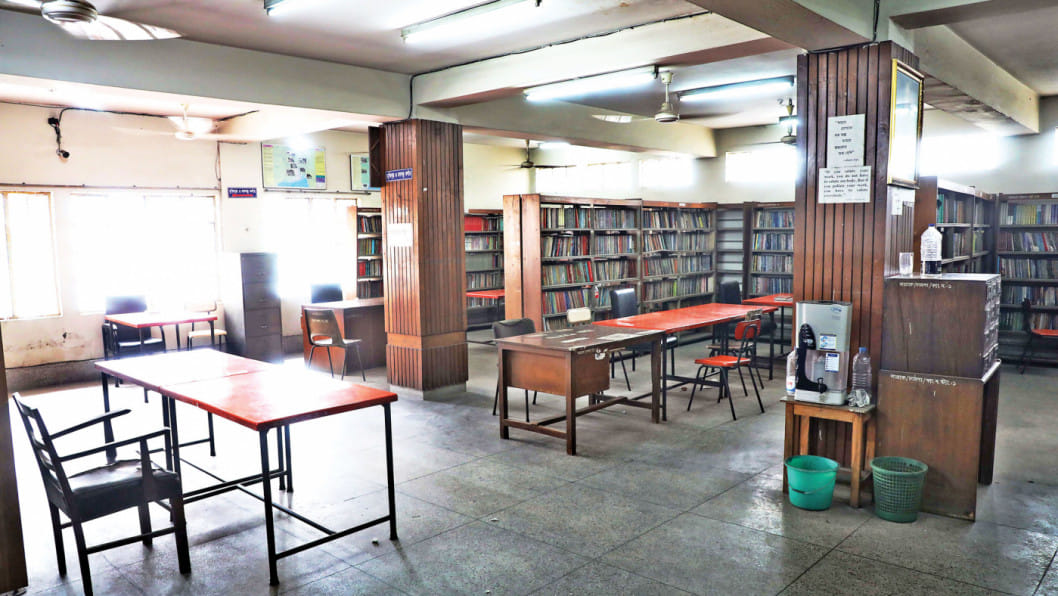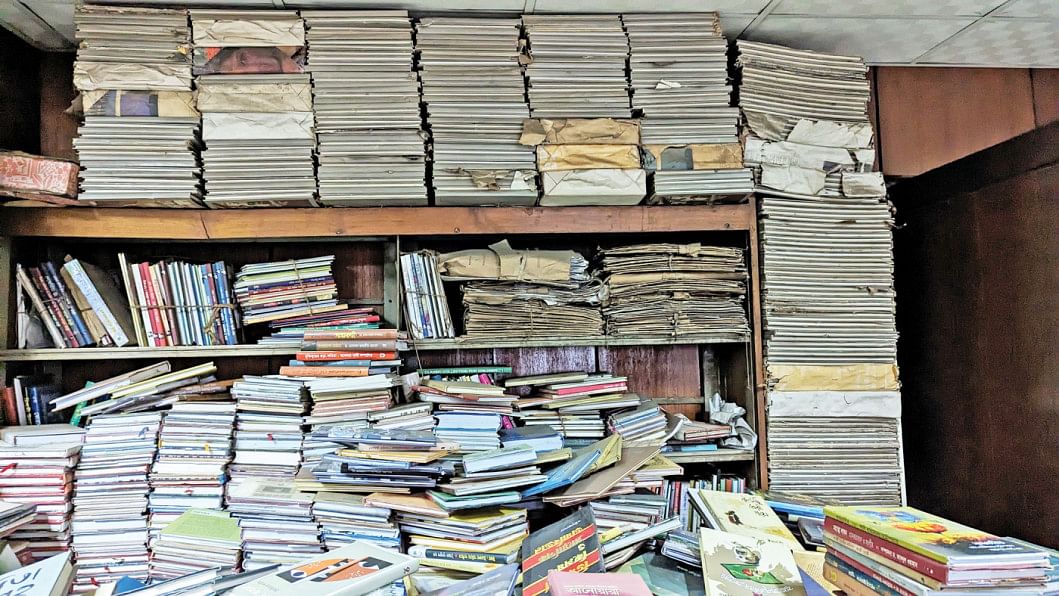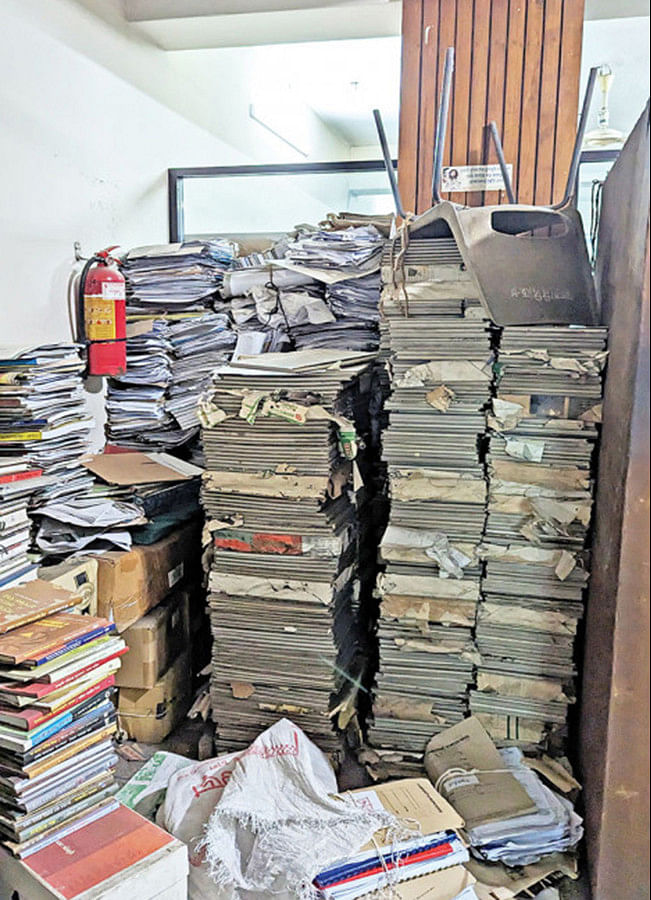The silent demise of National Book Centre
In a shabby, derelict building located at Gulistan's Bangabandhu Avenue, lies Bangladesh's only state-run organisation that looks after non-government libraries and takes initiatives to popularise reading books.
The organisation, called Jatiya Grantha Kendra (National Book Centre), a statutory body under the Ministry of Cultural Affairs, is barely serving its purpose.
According to the National Book Centre Act, 1995, the centre is supposed to do a range of activities such as developing readership among children and youth, establishing and maintaining a library at the centre, providing financial and technical assistance to non-government libraries, conducting research on readership and the publication industry, collecting and exhibiting rare books and manuscripts and so on.

However, due to poor infrastructure, extremely low manpower and resources, the centre is not in a position to conduct any of these activities. Many people, who are related to library management, and publishing industries and general readers do not even know that such an organisation exists at all.
For instance, there is a library of more than 11,000 books in this centre. Many of these books are rare reference books, which cannot be found anywhere else in the country. However, very few people visit this library.
Most of the books offered by the centre are political books written by the leaders and activists of the ruling party. Again, many influential government officials who write books to attract the attention of the political high-ups force the centre to buy them and distribute them to the local libraries.
According to the librarian of the centre, he has not seen any readers who came to read books in the last couple of years. "Some people come here sometimes to read newspapers and rest," he said.
The library offers an annual membership with a fee of only Tk 100.
However, the condition of the books in this library is also disastrous. The books have not been arranged in a systematic order since the establishment of the library in 1995.
Like all other state-owned libraries, this one was supposed to collect all the national dailies and archive them systematically.
However, this important task was halted many years ago due to the shortage of staff. Heaps of files of old newspapers and hundreds of rare, old books were found stacked over each other outside shelves in the dark corners of the library.
Another irony is the fact that a year ago, the authorities purchased three Amazon Kindles, a device to read, download and buy e-books, to attract readers to their library whereas the library does not have any digital platform.
Even the authorities could not systematically organise the books in the last 28 years let alone digitising the books. The devices remain useless in the storeroom of the centre since their purchase.
Besides maintaining its library, another task the centre has been doing is to assist non-government libraries all over the country in the form of books and funds.

However, the libraries can hardly benefit from the assistance. There are allegations that the centre does not provide quality books to the libraries.
This correspondent talked to the authorities of several libraries which regularly receive assistance from the centre. The librarians of those libraries told this correspondent, requesting anonymity, that most of the time they do not take the books offered by the centre as most of these books will not attract readers.
One of the librarians said, "Most of the books offered by the centre are political books written by the leaders and activists of the ruling party. Again, many influential government officials who write books to attract the attention of the political high-ups force the centre to buy them and distribute them to the local libraries. Sometimes we have to accept these books but we know very well that nobody is going to read them."
The librarians fear that if their names are disclosed they may face retaliation from the centre's authority.
However, their statements were found quite factual. One of the storerooms of the centre is full of books rejected by the libraries. There is no facility to preserve these books. As a result, tens of thousands of books are rotting in a large room piled up upon each other.
One of the officials in charge of the storerooms said, "I do not know how many books are in this room, as we do not have any designated official or any resource to store these books in an organised manner."
"I feel sorry about these books as there are many books here which are extremely valuable but rejected by the libraries as they could not appreciate their values. However, we cannot transfer them to our libraries or anywhere else as we do not have the space and required human resources to maintain them. Then again, we cannot save them either. They are just being eaten by the worms," he said.
He pointed to some albums which he claimed were collections of historic photos, some of which are of the Liberation War. However, the books are stashed in such an inaccessible corner that they could not be reached despite several attempts.
The authorities of the non-government libraries are not happy about the financial assistance either. Every year, the centre spends around Tk 5 crore to assist libraries. Last year, the centre distributed Tk 4,70,00,000 (half of it in books) to 891 libraries. Libraries which are of Category A received around Tk 30,000 each, those belonging to Category B received around Tk 24,000 and the Category C libraries received around Tk 20,000 in cash.
According to the library authorities, with such a meagre annual allowance, they can bear a maximum of two months' worth of establishment costs.
"Even collecting this allowance is a difficult task. We have to get several approvals from the district administration. Then we have to go to Dhaka to collect the money and the books," said one of the librarians.

"Nowadays, the centre is including more libraries in the donation list whereas they are not increasing the amount. As a result, the amount of donation per library will decrease in the future," he added.
A director of a community-based library in Dhaka told this correspondent, "We have been demanding that at least the salary of the librarians of every library should be paid by the centre. If they can provide this support, we shall be able to revive many declining libraries."
Again, there are also questions about how the centre selects libraries for their donations. It has been alleged that many libraries that are receiving books are not functional at all.
When asked, Minar Monsur, director of the centre, assured that several initiatives have been taken to resolve these issues.
"Despite a severe shortage of resources, we have already recruited some skilled staff with the help of whom I have started modernising the centre. I have already started reorganising the library using modern software. We shall gradually digitise the entire library," he said.
"We verify the operations of the libraries through the district administration. We do not have any district or divisional-level staff. We do not have any monitoring mechanism. Currently, I'm running this office with only 10 officers," he added.
The director assured that obstacles in disbursing the funds will be removed soon as funds will be transferred electronically from the finance ministry directly to the bank account of the library from the next fiscal year.
Regarding the quality of books and ways of preserving them, Minar said, "Many authors donate books to us whom we cannot say no to. However, we do not force anybody to take our books. They can select freely which book they want."
"This building is not suitable for preserving or reading books at all. The building is very old and quite risky. We will move to the new library building at Shahbagh once it is finished. So, these problems will also be solved soon," he added.

 For all latest news, follow The Daily Star's Google News channel.
For all latest news, follow The Daily Star's Google News channel. 

Comments